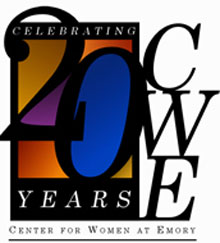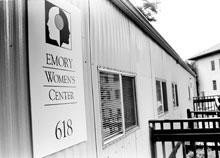Much change can come about in 20 years. On Friday, Sept. 28, the Center for Women at Emory celebrated its 20th anniversary by looking back at its beginnings, its growing pains, and its aspirations for the future.

Accepted wisdom is that the origins of the Women's Center, as it was then called, were forged out of a traumatic event at Emory: the rape of two female students on Fraternity Row. However, it was a more complicated evolution in that the center came into being at a time when women, members of racial and ethnic minorities, and the LGBT community were seeking equity and a bigger stake in Emory's future.
Founding director Ali P. Crown was a member of the President's Commission on the Status of Women at the time, as were many of the center's founders. "Twenty years is a remarkable record and one that has seen many amazing accomplishments and will continue to see them—long into the future," she said in a video shown at the Sept. 28 celebration.
Marianne Scharbo-DeHaan, a longtime Center for Women board member and supporter, recalled the center's beginnings. "The center was very meaningful to me," said the professor emerita in the School of Nursing, noting how it helped combat her sense of isolation. "Seeing how it started off so small" — in a trailer next to the loading dock of the Dobbs University Center — "it's really heartwarming to see it now."
20 years of accomplishments
Twenty years later, there are lactation rooms across campus for working mothers, the origins of which lie in the Center for Women's original Nursing Nest, a long line of Unsung Heroine Award recipients throughout Emory's colleges, schools and administrative units, and thousands of Emory faculty, staff and students who have been touched by the center's programs and initiatives.

The Center for Women's early campus home. Emory Photo/Video.
Today, the center's focus lies less in the many programs and events it once hosted, and more in continuing to find new ways to create the best environment for women at Emory. Its work now encompasses four aims: developing and diversifying public scholarship at Emory; reducing sex discrimination and sexual assault and harassment; diversifying Emory faculty and senior administration; and supporting women's leadership across all sectors of the university—especially in the student body.
As befits its beginnings as an advocate for the safety and well-being of women, the center was instrumental in creating an Emory College course in the spring of 2012 in partnership with Men Stopping Violence, an Atlanta-based organization that teaches a "community-accountability model" for preventing intimate partner violence in which individuals as well as communities are held accountable for abuse.
Raising women's profiles
Dona Yarbrough, the center's current director and associate vice provost for community and diversity, said that this year the center is taking a much more central role in working with faculty search committees to increase recruitment of women and minorities in the faculty. "We are making inroads," she noted, "but it's a slow and often behind-the-scenes process."
Another way in which the center seeks to make women heard is in its Public Voices Faculty Fellowship program, which looks to increase the number of women and people of color writing for the nation's op-ed pages and serving as media experts and public intellectuals. Yarbrough reported that, to date, fellows have produced six op-ed pieces about issues ranging from the lack of gay black couples on television to the merits of eating organic food.
More than 100 guests attended the center's 20th anniversary celebration, which coincided with Emory's Homecoming Weekend. Natasha Trethewey, director of the creative writing program and the recently named U.S. Poet Laureate, gave the evening's keynote address.

